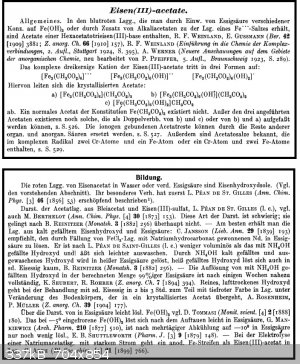dermolotov
Hazard to Others
  
Posts: 114
Registered: 13-12-2014
Location: Toronto, Canada
Member Is Offline
Mood: Free
|
|
Oxidation to higher metal oxidation states
I've never done this and achieving iron (iii) acetate seems to be a much harder goal than I envisioned.
I have a beaker here sitting of Iron (II) Hydroxide after reaction Iron Filings with HCl, boiling off most of the water, and adding it slowly to a
concentrated solution of NaOH. Then filtering.
I have searched up various methods to create Iron (II) Acetate but to actually oxidise it to Iron (III) Acetate seems difficult.
It seems that a basic oxidation of hydrogen peroxide generates the hydroxyl radical and might be hindered by a protic solvent (like water in the 30%
hydroxide solution). I have found a lot of oxidation methods using things like benzaldyhyde but they produce 1) maximums of 55% yield and 2) are
incredibly roundabout compared to a simple addition of an oxidiser.
Has anyone had good luck oxidising metals to higher states?
I'm prepared to carry out a direct oxidation
1. of Ferrous Acetate in Methanol with Hydrogen Peroxide
2. of Ferrous Acetate in GAA with Hydrogen Peroxide
3. of Ferrous Acetate in GAA with Potassium Permanganate / Hypochlorite
Would either of those three work? Am I just overthinking things?
www.alchemylabsupply.com/
Product Director
Canadian Chemical Legal Liaison
Sales Expert
Amateur Munitions/Explosive Expert
Safety Coordinator
Walking Oxymoron
|
|
|
DraconicAcid
International Hazard
    
Posts: 4363
Registered: 1-2-2013
Location: The tiniest college campus ever....
Member Is Offline
Mood: Semi-victorious.
|
|
I'm not even sure if you can get iron(III) acetate, since iron(III) tends to hydrolyze. It would be easy enough to oxidize the iron(II) to iron(III)
just by precipitating it as the hydroxide and leaving it exposed to air....possibly that gelatinous mass could be centrifuged and reacted with GAA....
Please remember: "Filtrate" is not a verb.
Write up your lab reports the way your instructor wants them, not the way your ex-instructor wants them.
|
|
|
fluorescence
Hazard to Others
  
Posts: 285
Registered: 11-11-2013
Member Is Offline
Mood: So cold outside
|
|
Well didn't do it by myself but I can give you some examples from literature. Unfortunately I don't have the rest of the pages so I can't tell you if
there is more but I'll give you a summed up translation:
So to sum it up:
"In the blood-red solution that forms by adding Acetic Acid to different conc. of Fe(OH)3 or by adding Alkaline Acetates to a solution of
any Fe(III)-Salt are Acetaes of a Hex-Acetato-Tri-Iron(III)-Base present. The trinuclear Iron(III)-Acetate Complex cation is present in three forms:
[...] [...] [...]
From these the crystallized Acetates are derived.
A normal acetate of the compositon Fe(CH3CO2)3 isn't known. "
Then there is along text about Acetates that have been published but are wrong.
The second box says
" Formation: The red solution of IronAcetate in water or dilut. Acetic Acid are "Iron-Hydroxyde-Brines (brine like in the conc. salt lakes)
Formation with Lead Acetate and Iron(III)Sulfate is quite difficult and according to Reinitzer it doesn't even work.
Best is to use cold [fresh] precipitated Iron(III?)Hydroxide and Acetic Acid which is made by precipitating an FeCl3-Solution with
Sodiumbicarbonate and dissolving the precipitate in diluted Acetic Acid
[...]
When a sodium acetate solution is electrolyzed with a high current Iron(III)Acetate will go into solution if for the anode Iron metal is used."
That's pretty much all I have acess to.
The source is
"Gmelin Handbuch der Anorganischen Chemie, 8th edition, Eisen Teil B Lieferung 3 - Verbindungen, 1974"
I hope this helps you.

|
|
|